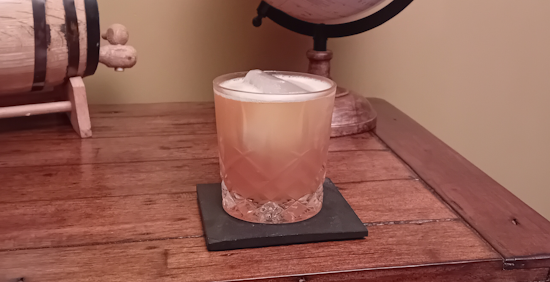
Named for the Pennsylvania farmers and distillers fight against the new US governments taxes on whiskey.
Half-fill a cocktail shaker with ice.
Add all ingredients and shake until well-chilled.
Strain into a tumbler over fresh ice.
[cocktail-ingredients]
History of the Whiskey Rebellion
The Whiskey Rebellion (also known as the Whiskey Insurrection) was a violent tax protest in the United States beginning in 1791 and ending in 1794 during the presidency of George Washington. The so-called "whiskey tax" was the first tax imposed on a domestic product by the newly formed federal government. Beer was difficult to transport and spoiled more easily than rum and whiskey. Rum distillation in the United States had been disrupted during the American Revolutionary War, and whiskey distribution and consumption increased afterwards (aggregate production had not surpassed rum by 1791). The "whiskey tax" became law in 1791, and was intended to generate revenue for the war debt incurred during the Revolutionary War. The tax applied to all distilled spirits, but consumption of American whiskey was rapidly expanding in the late 18th century, so the excise became widely known as a "whiskey tax". Farmers of the western frontier were accustomed to distilling their surplus rye, barley, wheat, corn, or fermented grain mixtures to make whiskey. These farmers resisted the tax. In these regions, whiskey often served as a medium of exchange. Many of the resisters were war veterans who believed that they were fighting for the principles of the American Revolution, in particular against taxation without local representation, while the federal government maintained that the taxes were the legal expression of Congressional taxation powers.
Throughout Western Pennsylvania counties, protesters used violence and intimidation to prevent federal officials from collecting the tax. Resistance came to a climax in July 1794, when a US marshal arrived in western Pennsylvania to serve writs to distillers who had not paid the excise. The alarm was raised, and more than 500 armed men attacked the fortified home of tax inspector John Neville. Washington responded by sending peace commissioners to western Pennsylvania to negotiate with the rebels, while at the same time calling on governors to send a militia force to enforce the tax. Washington himself rode at the head of an army to suppress the insurgency, with 13,000 militiamen provided by the governors of Virginia, Maryland, New Jersey, and Pennsylvania. The rebels all went home before the arrival of the army, and there was no confrontation. About 20 men were arrested, but all were later acquitted or pardoned. Most distillers in nearby Kentucky were found to be all but impossible to tax—in the next six years, over 175 distillers from Kentucky were convicted of violating the tax law. Numerous examples of resistance are recorded in court documents and newspaper accounts.
The Whiskey Rebellion demonstrated that the new national government had the will and ability to suppress violent resistance to its laws, though the whiskey excise remained difficult to collect. The events contributed to the formation of political parties in the United States, a process already under way. The whiskey tax was repealed in the early 1800s during the Jefferson administration. Historian Carol Berkin argues that the episode, in the long run, strengthened US nationalism because the people appreciated how well Washington handled the rebels without resorting to tyranny.
AI generated anecdote for article length
On a crisp autumn day in Gettysburg, Pennsylvania, five male ex-Army buddies, Alex, Ben, Chris, David, and Ethan, gathered at a cozy bar to celebrate David's new job. The bar was decorated with historic Civil War memorabilia, and the fireplace was crackling merrily.
The friends ordered drinks, and all opted for the Whiskey Rebellion cocktail, a refreshing and flavorful drink made with equal parts Pimm's, rye whiskey, simple syrup, and lemon juice. As they sipped their cocktails, they chatted and laughed, catching up on each other's lives.
David shared the details of his new job, and Ben talked about his upcoming trip to Europe. Chris told them about his new dating life, and Alex shared his excitement about the upcoming college football season. Ethan regaled them with stories from his recent work trip to Japan.
As the afternoon wore on, the friends' conversation turned more philosophical. They discussed their hopes and dreams for the future, and the challenges they had faced along the way. They supported each other through thick and thin, offering advice and encouragement.
At one point, David raised his glass and said, "To friendship, the greatest gift of all." The others echoed his words, clinking their glasses together.
The friends continued to drink and talk until the early hours of the evening. By the end of the night, they were feeling closer than ever. The Whiskey Rebellion cocktail, with its complex flavors and refreshing finish, had served as the perfect backdrop for their celebration of friendship.
The next day, as the friends sobered up, they reflected on the previous night. They realized that the Whiskey Rebellion had been more than just a drink. It had been a symbol of their friendship, a testament to the bond that they shared.
From that day on, the Whiskey Rebellion became a special drink for the five friends. They would often order it when they met up for celebrations or simply to catch up. And whenever they drank it, they would be reminded of their special night in Gettysburg, and the bond of friendship that they shared.
One day, many years later, the five friends found themselves back in Gettysburg, celebrating Ethan's 50th birthday. They decided to visit the same bar where they had shared their Whiskey Rebellions all those years ago.
As they sat at the bar, sipping their drinks and reminiscing about the past, they realized that their friendship had only grown stronger over the years. They had been through so much together, but their bond had remained unbreakable.
Raising their glasses, they toasted their friendship and the many years to come. And of course, they couldn't resist ordering a round of Whiskey Rebellions. As they took their first sips, they were transported back to that special night in Gettysburg, when they had first discovered the magic of the Whiskey Rebellion.
The Whiskey Rebellion was more than just a drink. It was a symbol of their friendship, a testament to the bond that they shared. And wherever they went, it would always remind them of their special night in Gettysburg, and the friends who had been there for them through thick and thin.
Ingredients
Directions
Half-fill a cocktail shaker with ice.
Add all ingredients and shake until well-chilled.
Strain into a tumbler over fresh ice.
